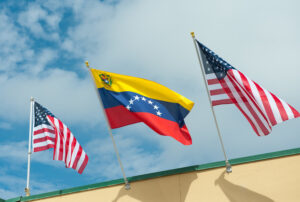It has been nearly one year since the collapse of the most robust negotiations process meant to address Venezuela’s crisis so far. While the U.S. government has since come out in support of renewed negotiations, the White House has kept in place the same red lines which handicapped talks last year.
In a new Washington Post op-ed, WOLA Director for Venezuela Geoff Ramsey explores how the Trump administration has rejected trading sanctions relief for anything other than Maduro’s resignation, which places U.S. policy at odds with the consensus of Venezuela’s opposition.
As Ramsey argues:
In August 2019, negotiators were closing in on a deal: in exchange for relief from sanctions that have aggravated an already deep economic crisis since 2017, Maduro would concede to new presidential elections in 2020. There was just one problem: the Trump administration didn’t back the deal. “The government officially accepted going to elections, but in exchange for lifting of sanctions and Maduro staying,” one opposition official close to the negotiations told The Post at the time. ‘The U.S. doesn’t want that.”
Ramsey poses the question: If the regime were eventually coaxed to the negotiating table, could the U.S. government agree to conditions lifting oil and financial sanctions ahead of new, verifiably free and fair presidential elections, even if Maduro stayed in the presidential palace until they are held?
While officially the U.S. position remains unchanged, some in the administration suggest there may be new flexibility. Unless this is confirmed and stated clearly by U.S. officials, however, the answer appears the same. Even while the Venezuelan opposition is open to leveraging sanctions relief in exchange for verifiable electoral conditions, the Trump administration would likely reject that deal.
Read the entire article at the Washington Post. For more of WOLA’s analysis, visit the Venezuelan Politics and Human Rights Blog.


